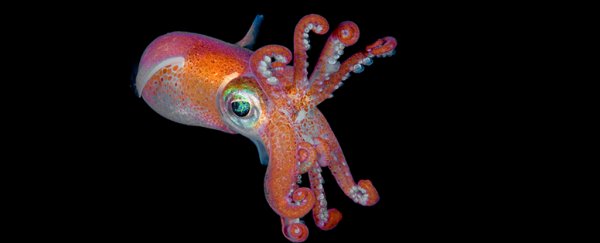The UK has officially recognized octopuses and crabs as sentient beings – finally catching up to well-established science on these intelligent animals.
"The science is now clear that decapods and cephalopods can feel pain and therefore it is only right they are covered by this vital piece of legislation," UK Animal Welfare Minister Lord Zac Goldsmith said in a statement.
The update to the Animal Welfare Sentience Bill, which would see decapods and cephalopods protected alongside all back-boned animals from frogs to dogs, follows a review of over 300 scientific studies by the London School of Economics and Political Science.
Cephalopods, such as squid and octopuses, and decapods (including crabs and lobsters) are already afforded protections under animal welfare legislation in other European countries like Norway, Sweden, and Austria.
"Sentience is the capacity to have feelings, such as feelings of pain, pleasure, hunger, thirst, warmth, joy, comfort, and excitement," the researchers explain in the report.
The researchers assessed eight measures of sentience in these invertebrates, including learning ability, the presence of pain receptors and their connection to the brain, response to anesthetics, and behaviors that demonstrated protectiveness of an injury.
"Crustaceans and cephalopods undoubtably experience the world in extremely different ways to ourselves. What matters, though, is whether that experience entails conscious experience of pleasure and pain," the report concludes.
"We believe that the evidence is sufficient to show that these animals do experience pleasure and pain."
These amazing animals display such capacities thanks in part to their complex central nervous systems, despite how alien some of their traits, like octopus arm-'brains', may appear to us.
Cephalopods have clearly demonstrated their incredible intelligence. Cuttlefish, for example, can pass cognitive tests designed for human children, while octopuses can recognize individual humans, remember how to solve puzzles they've encountered before, and they're notorious escape artists too.
They also emotionally feel pain, and when trapped in environments that lack stimulation, they grow frustrated and bored just like we do. They may even be able to dream.
While not as famously as the octopus, crabs have also demonstrated an ability to learn via association too. They can learn to navigate complex mazes and recognize and remember a fake seagull isn't a threat. They also experience pain, demonstrate protective and learning behaviors to avoid it, and suffer stress from excessive noise.
The report points out that while these characteristics are lacking for some of the species the proposed updates cover, this is due to lack of research rather than evidence of absence. So it recommends extending protections to all animals within these two classes.
This update to the Sentience Bill looks great in theory, but unless it comes with action and enforcement it could merely be a political example of 'wokewashing'. The new amendment will only be considered for future government decisions, so the problematic practices that already take place may continue to get a free pass.
Many questioned whether the Sentience Bill has the power to change anything during the parliamentary debate.
"The Government can simply ignore it and do their own thing," said Baroness Jenny Jones. "Just as they did with climate change and carbon credits, they can do with animal welfare and animal sentience."
What's more, focusing society's attention on individual animal welfare can be used to distract from or even hinder action on larger systemic problems these animals face – like our wide-scale destruction of their habitats.
The report recommends taking "proportionate steps to regulate practices that are a source of reasonable and widespread animal welfare concerns".
This includes banning declawing of decapods and slaughtering them humanely – which of course means no more cruel live lobster boilings. They also suggest that only trained handlers should be allowed to sell live crustaceans.
"The amendment will also help remove a major inconsistency: octopuses and other cephalopods have been protected in science for years, but have not received any protection outside science until now," says cognitive science philosopher Jonathan Birch.
While recognizing octopus and crabs as sentient is a positive step to improving our destructive relationship with our wider world – a step that really should be taken globally – time will tell if this new amendment will help or further hinder these magnificent beings that we share our world with.
The full report on cephalopod and decapod sentience can be found here.
